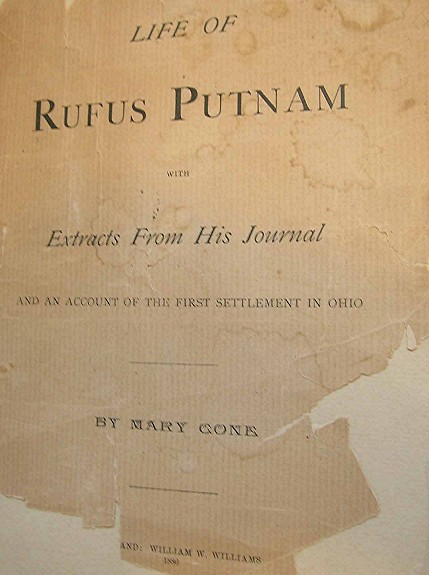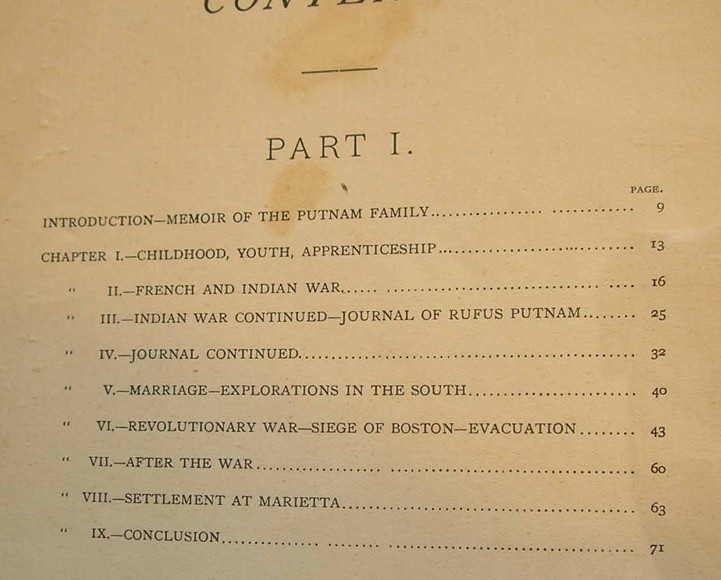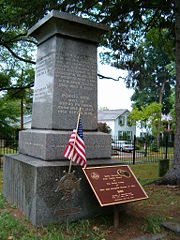Chapter VII.
AFTER THE WAR
The war being over, those who had been actors therein found their occupation gone and nothing that was satisfactory to fill the vacuum thus occasioned. To many the losses occasioned by their long absence from their homes and business made it difficult, if not impossible, to resume the employments that had once been sufficient to satisfy their wants and their ambition. To others, their old trades and occupations had become distasteful, because of larger knowledge and more varied experience. In this emergency their eyes followed the sun in its western way, and they said to one another: “Let us go thither; in. that new country we may be able to do better for ourselves and leave to our children a goodlier inheritance than they could ever enter into in our old homes.”
No one was, probably, more influenced by these considerations than General Rufus Putnam. After the treaty of peace was signed and he had resigned his commission, he went home to Rutland, Massachusetts, and resumed his old employments of surveying and farming. We can well believe that these occupations had lost their zest. After having been for more than seven years bearing a part in stirring events, that took hold on larger interests than anything pertaining to personal emoluments or individual good—after striving earnestly to accomplish something on a large scale for public interests—it must have seemed paltry and insignificant to work within narrow limits for private advantage. But the law of necessity is imperative and has no “bowels of mercy.” He must do something, and he did the best thing that he could find to do. In the journal already so often quoted, the writer says:
In June, 1783, previous to my leaving the camp, the officers of the army, particularly of the northern states, petitioned congress for a grant of a tract of land northwest of the Ohio river; but learning, by a letter from General Washington of June, 1784, that nothing had been done on the said petition, I engaged with the committee of eastern lands, to survey certain lands bordering on the bay of Passamaquoddy, and August 2, 1784, I left home for that country. I returned to Boston the eighth of the following November.In 1785 the general assembly of Massachusetts were so well satisfied with my services the last year that they appointed me one of the committee for the sale of their eastern lands. While I was in Boston, my election as one of the surveyors of the lands in the western territory was announced to me, in a letter of May 20 from the secretary of congress, and requiring an immediate answer of my acceptance. I was considerably perplexed as to what answer to return, for I was not only under engagement to the state of Massachusetts—which I could not with honor disregard without their consent—but surveyors and hands were engaged for the season, provisions laid in and a vessel chartered to take us to the eastern country. At the same rime, I was very lothe to relinquish my appointment for the western country. On a view of the circumstances, I wrote a letter of acceptance to the secretary of congress, and a letter to the Massachusetts delegates in congress, requesting their influence that General Tupper might be accepted as a substitute for me in the western country until I could attend to the service in person.
This was one step in the direction of opening a war for granting the petition which had been presented to congress by General Putnam and others in 1786. During this long delay General Putnam seems never to have despaired of ultimate success. His thoughts still dwell on that western land, which something seemed to tell him was to be the scene of his endeavors and the ripe fruit of his effort. Was there vouchsafed him prophetic vision in which was revealed some small part of what was to be? Did he see this great west with its wheat and cornfields, and iron and oil and furnaces and railroads, with a population known for its intelligence and enterprise, from which should be chosen Presidents and the highest officials both civil and military; and from this Northwest territory, where he was trying to lay a corner stone, did he know that when the hand of rebellion was raised to overthrow the government, that he had fought to establish, then should there go forth an army so strong in its patriotism and its numbers that no treason could endure its onset? Whether he saw all this or not, he saw enough to make him persistent in carrying out his plans.
He was ably and warmly seconded in his efforts in this direction by George Washington, who seems always to have felt a peculiar interest in the plans and prospects of the Ohio company. We can well believe that his own exploration in that region in the heyday of his youth tinged all his after thoughts and feelings in regard to it, but in 1763 he had made an expedition thither in the interests of the first Ohio company, in which his brother Lawrence was interested. He then passed down the Ohio and paused awhile to examine the region at and around the mouth of the Muskingum. He seems always to have remembered the glamour which his youthful eyes saw spread over this pleasant and attractive country.
In 1783 the legislature of Virginia transferred to the general government all right and title to its lands northwest of the Ohio, with the important exception of a large tract between the Sciota and Little Miami rivers, since known as the “Military district.” This tract of rich land was reserved to pay the Revolutionary soldiers of the Continental line which Virginia had sent into the army. Although all impediments in the way of Virginia sending colonists to make a beginning in this great territory were thus removed, it was not given to them to transplant their customs and institutions into that virgin soil and give character to the states that were then to A wise Providence ordained that the industry and economy, the stamina and energy of New England should there take root and flourish. But the act of congress accepting the grand gift at the hands of Virginia removed one serious obstacle from the way of General Putnam and his confreres. As a reason for inaction, the government had said that they had no clear right and title to the land. As New York, Massachusetts and Connecticut, the last with a reservation, also relinquished their claims, that excuse could no longer be given.
From henceforth General Putnam’s history is identified with that of Marietta, and after a few preliminaries we shall let him tell his own story, even at the risk of repetition. In respect to the superior ability of Putnam strong proof could be found, if proof were wanted, in the facts, that among these men who made the first settlement in the Northwest territory, though there were many of them graduates of colleges and had filled and were capable of filling well important offices and high places, he was facile princeps. Always cool and clear-headed, it was safe to depend upon him in emergencies, no matter how serious or unexpected, inflexible in his integrity, just and upright in all his dealings, it was safe to commit to him any interest, no matter how important it might be. It is not strange, therefore, that he was so often employed as a mediator and resorted to for counsel. It cannot have escaped observation, in the progress of this narrative, that he was frequently employed to conduct difficult negotiations and manage business where sound judgment and unimpeachable honesty were necessary to success; and this thing is noticeable, he always succeeded. There is no failure recorded in any enterprise he ever undertook, where the plans and execution were in his own hands. He was wise to foresee as well as careful to execute. There seems but little doubt that the colony of which he was the head would have been driven off or exterminated in the dreadful Indian war that followed so soon their coming, had it not been for the wisdom, prudence and experience of General Putnam and his compeers. Nor was he done with negotiations and the management of affairs, even when age made him feel that their weight was heavy.



